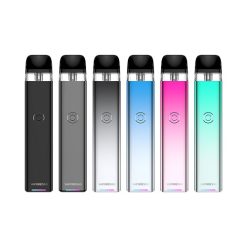The burgeoning vaping industry in South Africa has sparked interest in understanding its implications for local economies and communities. Researchers have begun to investigate the economic and social dynamics associated with the proliferation of vape shops across the country.
Understanding The Vaping Industry In South Africa
Vaping, as we know it today, has a relatively short history in South Africa, dating back to the early 2010s. The introduction of electronic cigarettes and vaping devices signified a shift in the tobacco landscape. Local entrepreneurs seized this opportunity to establish vape shops, offering an alternative to traditional smoking.
-
Uwell Caliburn G2 kit
R285.00 -
Smok Novo 4 Kit
R320.00 -
Vaporesso Luxe PM40 Kit
R549.00 -
Vaporesso XROS 3 Kit
R540.00
The South African vaping industry has witnessed significant growth over the years. Vape shops have mushroomed across cities and towns, catering to a diverse clientele. This expansion reflects changing consumer preferences and growing awareness of vaping as a potential harm reduction tool.
Role Of Online Retailers In The Vaping Industry
Online retailers have revolutionised the vaping industry, offering a wealth of opportunities and conveniences for both consumers and businesses. Here, we explore the pivotal role played by online retailers in this rapidly evolving sector.
Accessibility And Convenience
- Global Reach: Online retailers transcend geographical boundaries, allowing consumers to access vaping products from anywhere in the world. This global reach broadens consumer choices and promotes healthy competition within the industry.
- 24/7 Shopping: Unlike physical stores, online vape shops are open 24/7. This accessibility is a boon for customers, enabling them to shop at their convenience, whether it’s late at night or during weekends.
- Wide Product Selection: Online retailers typically offer a vast array of vaping products, from e-cigarettes and e-liquids to accessories and replacement parts. Consumers can explore a wide range of options and find precisely what suits their preferences.
Competitive Pricing And Discounts
- Price Transparency: Online retailers often provide detailed product descriptions, specifications, and prices, allowing consumers to make informed choices. Price transparency fosters trust and ensures that customers receive value for their money.
- Competitive Pricing: Due to reduced overhead costs compared to brick-and-mortar stores, online retailers can offer competitive pricing. This affordability is particularly appealing to budget-conscious consumers.
- Promotions and Discounts: Online vape shops frequently run promotions, sales, and loyalty programs. Customers can take advantage of discounts, bulk purchasing options, and rewards for repeat business.
Product Information And Reviews
- Comprehensive Product Information: Online vape retailers provide comprehensive product information, including specifications, ingredients, and usage instructions. This empowers consumers to make informed decisions about their purchases.
- Customer Reviews: Customer reviews and ratings play a vital role in the online vaping ecosystem. They provide valuable insights into product quality, flavour preferences, and overall customer satisfaction. Shoppers can benefit from the experiences of others.
Privacy And Discretion
- Privacy: Online shopping offers a level of privacy that physical stores cannot match. Individuals who may be hesitant to visit a local vape shop for personal reasons can discreetly explore vaping options online.
- Discreet Packaging: Many online vape retailers understand the importance of discretion. They often ship products in plain, unmarked packages to respect customers’ privacy.
Access To Information And Resources
- Educational Resources: Reputable online vape retailers often feature educational resources on their websites. These resources can include articles, videos, and FAQs that help consumers better understand vaping and its various components.
- Customer Support: Online retailers typically provide customer support through chat, email, or phone. This support helps address customer inquiries, troubleshoot issues, and provide guidance on product selection and usage.
Regulatory Compliance
- Age Verification: Responsible online vape shops implement robust age verification processes to ensure that only adults can purchase vaping products. This helps mitigate the risk of underage vaping.
- Labelling and Compliance: Online retailers must adhere to regulatory requirements for product labelling and quality. Trustworthy vendors ensure that products meet legal standards and are safe for consumers.
Innovations And Customisation
- Innovative Products: Online retailers often introduce consumers to innovative vaping products and technologies. They frequently stock the latest devices, flavours, and accessories, encouraging vapers to explore new experiences.
- Customisation Options: Many online vape shops offer customisation options for e-liquids, allowing customers to tailor nicotine strength and flavour profiles to their preferences. This level of personalisation enhances the vaping experience.
Economic Contributions Of Vape Shops
Vape shops are more than just retail outlets for vaping products; they are significant contributors to local economies in several ways. In this section, we delve into the economic impact of vape shops and how they play a pivotal role in fostering economic growth and stability.
Employment Opportunities And Job Creation
- Diverse Job Opportunities: Vape shops create a diverse range of employment opportunities within local communities. These opportunities span from sales and customer service positions to specialised roles like e-liquid mixologists and vape technicians.
- Lowering Unemployment Rates: The steady expansion of vape shops translates into a decreased unemployment rate in areas where they operate. These businesses not only provide jobs but also contribute to the stability of the local workforce.
- Support for Small Businesses: Many vape shops are locally owned and operated, supporting small business ownership and entrepreneurship. These businesses often become integral parts of their communities, further strengthening the local economy.
- Skills Development: Vape shop employees gain valuable skills in retail, customer service, and product knowledge. These skills can serve as a stepping stone to other career opportunities within and beyond the vaping industry.
Tax Revenue Generated By The Vaping Industry
- Excise Taxes: The vaping industry contributes significantly to government revenue through excise taxes on e-cigarettes, e-liquids, and related products. These taxes are imposed at both the national and local levels.
- Supporting Public Services: The tax revenue generated from vaping sales can be channelled into public services such as healthcare, education, and infrastructure development. This revenue helps fund projects that benefit local communities.
- Balancing Budgets: In regions facing budgetary constraints, the tax income from the vaping industry can provide a much-needed infusion of funds. It helps local governments balance budgets and meet essential financial obligations.
Effects On Surrounding Businesses
- Benefits for Adjacent Retailers: Vape shops have a spillover effect on surrounding businesses. The increased foot traffic they attract can significantly benefit adjacent retailers, such as convenience stores, cafes, and local boutiques.
- Collaborative Efforts: In some cases, vape shops collaborate with neighbouring businesses to create synergistic promotions. For example, a vape shop might partner with a nearby coffee shop to offer discounts to mutual customers, fostering collaboration and shared success.
- Revitalising Commercial Areas: Vape shops often cluster in commercial areas, infusing new life into these regions. The steady influx of customers seeking vaping products stimulates economic activity, supporting businesses and landlords alike.
- Supporting Local Economies: Vape shops that source their products locally contribute to the growth of local suppliers and manufacturers. This support strengthens regional economies by creating demand for locally produced goods.
- Increased Property Values: The presence of thriving businesses like vape shops can have a positive impact on property values in commercial areas. As these areas flourish, property values tend to rise, benefiting property owners and the local tax base.
Community Engagement And Social Aspects
Vape shops extend their influence beyond retail transactions by actively engaging with local communities and contributing to various social aspects. In this section, we explore how vape shops become hubs for community involvement, health advocacy, and social responsibility.
Sponsorships And Community Events
- Support for Local Causes: Many vape shops actively engage with their communities by sponsoring events and initiatives that support local causes. These sponsorships extend to a diverse range of activities, from sports events to charity fundraisers.
- Health Awareness Campaigns: Vape shops often take the initiative to raise awareness about health-related issues, such as smoking cessation and harm reduction. They may host campaigns and workshops to educate the public about the potential benefits of vaping as a smoking alternative.
- Cultivating Goodwill: These community engagements foster goodwill and strengthen the shop’s ties to the local population. Vape shops are often seen as community partners, actively contributing to the betterment of the areas in which they operate.
- Local Collaborations: Some vape shops collaborate with local artists, musicians, and artisans to showcase their work within the shop. This not only promotes local talent but also creates a unique and vibrant atmosphere that enhances the shopping experience.
Role Of Vape Shops In Harm Reduction
- Smoking Cessation Support: Vape shops play a crucial role in harm reduction by providing an alternative to traditional smoking. They offer a range of vaping products designed to help smokers quit or transition to a less harmful option.
- Expert Guidance: Vape shop staff are often well-trained and knowledgeable about vaping products and their use. They provide expert guidance to customers, helping them choose the right products and nicotine levels to support their smoking cessation journey.
- Access to Resources: Vape shops may provide educational resources and materials on the benefits of harm reduction through vaping. This information empowers individuals to make informed decisions about their health.
- Community Advocacy: Some vape shops actively engage in advocacy efforts aimed at promoting vaping as a harm reduction strategy. They collaborate with public health organisations to champion policies that support harm reduction and smoking cessation.
- Support for Quitters: Vape shops often create a supportive environment for those looking to quit smoking. They offer encouragement and resources to individuals embarking on a smoke-free journey, further contributing to public health.
Health And Safety Initiatives
- Safety Education: Vape shops prioritise customer safety by providing information on responsible vaping practices. They educate customers about battery safety, proper e-liquid storage, and device maintenance to prevent accidents.
- Compliance with Regulations: Responsible vape shops diligently follow age verification protocols to prevent underage sales and ensure compliance with local regulations. They take steps to enforce age restrictions on vaping product purchases.
- Product Quality Assurance: Vape shops often source their products from reputable manufacturers and distributors. They prioritise quality and safety, ensuring that the vaping products they sell meet rigorous standards.
- Public Health Collaboration: Some vape shops collaborate with local public health organisations to disseminate information on vaping safety and harm reduction. These partnerships aim to provide accurate, science-based guidance to the community.
- Community Health Programs: In some instances, vape shops have initiated community health programs focused on smoking cessation and health improvement. These programs may include workshops, support groups, and access to smoking cessation resources.
Regulatory Challenges And Compliance
Navigating the complex web of regulations and ensuring compliance is a significant aspect of operating a vape shop. In this section, we explore the existing regulations governing vape shops in South Africa and how these businesses ensure compliance to operate within the bounds of the law.
Existing Regulations Governing Vape Shops In South Africa
South African vape shops must adhere to strict age restrictions. It is illegal to sell vaping products to individuals under the legal smoking age, typically 18 or 21, depending on regional regulations.
- Marketing Guidelines: Vape shops are subject to regulations regarding marketing and advertising. These guidelines may include restrictions on the promotion of vaping products in a manner that appeals to youth or misrepresents their risks.
- Labelling and Packaging: Vaping products must comply with stringent labelling and packaging requirements. These regulations dictate the inclusion of warning labels, ingredient listings, and health advisories on product packaging.
- Product Quality Standards: South African authorities impose product quality standards to ensure that vaping products meet safety and quality benchmarks. Compliance with these standards is essential to protect consumers from potential harm.
- Notification Requirements: Vape shops and manufacturers often have an obligation to notify relevant authorities about the products they intend to sell. This notification process may involve providing detailed information about ingredients and product specifications.
How Vape Shops Ensure Compliance
- Employee Training: Vape shops invest in staff training to ensure employees understand and follow the regulations. This training includes educating employees on age verification procedures, marketing restrictions, and compliance with labelling requirements.
- Strict Age Verification: Age verification is a fundamental practice in vape shops. Staff members rigorously verify the age of customers through identification checks before selling any vaping products. This process helps prevent underage sales.
- Monitoring and Reporting: Vape shops often implement monitoring systems to track sales and inventory. This data is used to ensure compliance with regulations and report any irregularities promptly. Reporting mechanisms are established to address violations promptly.
- Self-Regulation: Responsible vape shops engage in self-regulation to maintain high product standards. This includes routinely inspecting and verifying the quality of the products they sell and collaborating with reputable suppliers.
- Industry Associations: Some vape shops join industry associations and advocacy groups that work closely with government agencies to provide input on regulations. These associations aim to ensure that regulations are practical and effective while protecting consumers.
- Collaboration with Authorities: Vape shops collaborate with regulatory authorities to address concerns and ensure compliance. Open communication channels between businesses and government bodies facilitate the sharing of information and the resolution of issues.
- Regular Compliance Audits: Many vape shops conduct regular compliance audits to assess adherence to regulations. These audits encompass age verification checks, product quality assessments, and compliance with labelling requirements.
- Community Education: Vape shops often take an active role in educating their customers about regulations and responsible vaping practices. This education fosters a sense of responsibility among consumers and helps reduce regulatory violations.
Future Outlook And Sustainability
The future of South African vape shops is both promising and challenging. Projections indicate continued growth in the industry, driven by evolving technology and consumer preferences. However, challenges such as shifting regulations and public perception must be navigated.
Innovation remains a cornerstone of the vaping industry. Advancements in vaping technology, such as pod systems and heat-not-burn devices, continue to provide consumers with safer and more satisfying alternatives. These innovations position vape shops at the forefront of change.
Beyond economic and technological considerations, vape shops have the potential to contribute to sustainable communities. Many have initiated environmental initiatives, such as recycling programs for used vaping devices and e-liquid bottles. Additionally, supporting local charities and causes helps build stronger, more resilient communities.
In conclusion, South African vape shops have far-reaching impacts on local economies and communities. They create jobs, generate tax revenue, and stimulate economic growth. Moreover, these establishments actively engage with their communities, supporting causes and initiatives that promote well-being. As the vaping industry evolves, vape shops will continue to play a pivotal role in shaping the future of South African society. It is imperative that we closely monitor this industry’s developments, regulations, and contributions as it matures and adapts to changing circumstances.
The post The Impact Of South African Vape Shops On Local Economies And Communities appeared first on Vaperite.












